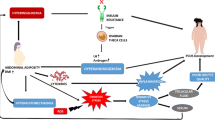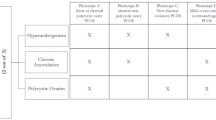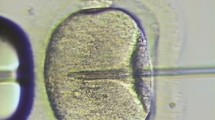Abstract
Background: Polycystic ovary syndrome (PCOS) is a main cause of infertility, particularly in high-risk settings such as spontaneous abortions (SAB). We aimed to evaluate the effect of genetic polymorphisms in ACE and plasminogen activator inhibitor-1 (PAI-1) on the occurrence of SAB in PCOS. Methods: One hundred and forty-two PCOS patients (83 women have a history of one or more unexplained SAB, 59 women have successfully live births) and 107 healthy controls matched for age and body mass index were included in the study. Levels of PAI-1, LH, FSH, testosterone, fasting glucose and insulin were measured. ACE deletion (D)/insertion (I) and PAI-1 4G/5G gene polymorphisms were performed. Results: The D/D and/or 4G/4G genotype frequency, the D or 4G allelic frequency, the combination of the ACE D/D and PAI-1 4G/5G, D/I and 4G/4G genotypes of PCOS patients with SAB women were statistically higher than non-SAB group (p<0.05). The 4G/4G or D/D genotype of PCOS with SAB patients had significantly higher PAI-1 levels than non-SAB women. Conclusions: The ACE D/I and PAI-1 4G/5G gene polymorphisms might represent risk factor in PCOS with SAB. Homozygosity for ACE D or PAI-1 4G polymorphisms as well as compound carrier status are significant positive explanatory variable for PCOS patients with SAB, which may result in increased PAI-1 concentrations and hypofibrinolysis and contribute to early pregnancy loss.
Similar content being viewed by others
References
Ehrmann DA, Liljenquist DR, Kasza K, Azziz R, Legro RS, Ghazzi MN; PCOS/Troglitazone Study Group. Prevalence and predictors of the metabolic syndrome in women with polycystic ovary syndrome. J Clin Endocrinol Metab 2006, 91: 48–53.
Barth JH, Yasmin E, Balen AH. The diagnosis of polycystic ovary syndrome: the criteria are insufficiently robust for clinical research. Clin Endocrinol (Oxf) 2007, 67: 811–5.
Franks S, Gharani N, Waterworth D, et al. The genetic basis of polycystic ovary syndrome. Hum Reprod 1997, 12: 2641–8.
Carmina E. Genetic and environmental aspect of polycystic ovary syndrome. J Endocrinol Invest 2003, 26: 1151–9.
Jakubowicz DJ, Iuorno MJ, Jakubowicz S, Roberts KA, Nestler JE. Effects of metformin on early pregnancy loss in the polycystic ovary syndrome. J Clin Endocrinol Metab 2002, 87: 524–9.
Glueck CJ, Wang P, Goldenberg N, Sieve L. Pregnancy loss, polycystic ovary syndrome, thrombophilia, hypofibrinolysis, enoxaparin, metformin. Clin Appl Thromb Hemost 2004, 10: 323–34.
van der Spuy ZM, Dyer SJ. The pathogenesis of infertility and early pregnancy loss in polycystic ovary syndrome. Best Pract Res Clin Obstet Gynaecol 2004, 18: 755–71.
Glueck CJ, Phillips H, Cameron D, Sieve-Smith L, Wang P. Continuing metformin throughout pregnancy in women with polycystic ovary syndrome appears to safely reduce first-trimester spontaneous abortion: a pilot study. Fertil Steril 2001, 75: 46–52.
Zhan M, Zhou Y, Han Z. Plasminogen activator inhibitor-1 4G/5G gene polymorphism in patients with myocardial or cerebrovascular infarction in Tianjin, China. Chin Med J (Engl) 2003, 116: 1707–10.
Kohler H, Grant PJ. Plasminogen-activator inhibitor type 1 and coronary artery disease. N Engl J Med 2000, 342: 1792–801.
Lockwood CJ. Regulation of plasminogen activator inhibitor 1 expression by interaction of epidermal growth factor with progestin during decidualization of human endometrial stromal cells. Am J Obstet Gynecol 2001, 184: 798–804.
Buchholz T, Lohse P, Rogenhofer N, Kosian E, Pihusch R, Thaler CJ. Polymorphisms in the ACE and PAI-1 genes are associated with recurrent spontaneous miscarriages. Hum Reprod 2003, 18: 2473–7.
Kim DK, Kim JW, Kim S, et al. Polymorphism of angiotensin converting enzyme gene is associated with circulating levels of plasminogen activator inhibitor-1. Arterioscler Thromb Vasc Biol 1997, 17: 3242–7.
Eriksson P, Kallin B, van ’t Hooft FM, Båvenholm P, Hamsten A. Allele-specific increase in basal transcription of the plasminogen-activator inhibitor-1 gene is associated with myocardial infarction. Proc Natl Acad Sci U S A 1995, 92: 1851–5.
Prisco D, Fatini C, Battaglini B, et al. Angiotensin converting enzyme DD genotype affects the changes of plasma plasminogen activator inhibitor-1 activity after primary percutaneous transluminal coronary angioplasty in acute myocardial infarction patients. Int J Clin Lab Res 2000, 30: 179–85.
Dossenbach-Glaninger A, van Trotsenburg M, Dossenbach M, et al. Plasminogen activator inhibitor 1 4G/5G polymorphism and coagulation factor XIII Val34Leu polymorphism: impaired fibrinolysis and early pregnancy loss. Clin Chem 2003, 49: 1081–6.
Glueck CJ, Awadalla SG, Phillips H, Cameron D, Wang P, Fontaine RN. Polycystic ovary syndrome, infertility, familial thrombophilia, familial hypofibrinolysis, recurrent loss of in vitro fertilized embryos, and miscarriage. Fertil Steril 2000, 74: 394–7.
Glueck CJ, Phillips H, Cameron D, et al. The 4G/4G polymorphism of the hypofibrinolytic plasminogen activator inhibitor type 1 gene: an independent risk factor for serious pregnancy complications. Metabolism 2000, 49: 845–52.
Glueck CJ, Wang P, Bornovali S, Goldenberg N, Sieve L. Polycystic ovary syndrome, the G1691A factor V Leiden mutation, and plasminogen activator inhibitor activity: associations with recurrent pregnancy loss. Metabolism 2003, 52: 1627–32.
Sampson M, Kong C, Patel A, Unwin R, Jacobs HS. Ambulatory blood pressure profiles and plasminogen activator inhibitor (PAI-1) activity in lean women with and without the polycystic ovary syndrome. Clin Endocrinol (Oxf) 1996, 45: 623–9.
Rotterdam ESHRE/ASRM-Sponsored PCOS Consensus Workshop Group. Revised 2003 consensus on diagnostic criteria and longterm health risks related to polycystic ovary syndrome. Fertil Steril 2004, 81: 19–25.
Tsanadis G, Vartholomatos G, Korkontzelos I, et al. Polycystic ovarian syndrome and thrombophilia. Hum Reprod 2002, 17: 314–9.
Fatini C, Gensini F, Battaglini B, et al. Angiotensin-converting enzyme DD genotype, angiotensin type 1 receptor CC genotype, and hyperhomocysteinemia increase first-trimester fetal-loss susceptibility. Blood Coagul Fibrinolysis 2000, 11: 657–62.
Hacihanefioglu B, Somunkiran A, Mahmutoglu I, Sercelik A, Toptani S, Kervancioglu E. Effect of hypertension therapy with the angiotensin-converting enzyme inhibitor lisinopril on hyperandrogenism in women with polycystic ovary syndrome. Fertil Steril 2002, 77: 526–8.
Yamada N, Arinami T, Yamakawa-Kobayashi K, et al. The 4G/5G polymorphism of the plasminogen activator inhibitor-1 gene is associated with severe preeclampsia. J Hum Genet 2000, 45: 138–41.
Fabbro D, D’Elia AV, Spizzo R et al. Association between plasminogen activator inhibitor 1 gene polymorphisms and preeclampsia. Gynecol Obstet Invest 2003, 56: 17–22.
Glueck CJ, Wang P, Fontaine RN, Sieve Smith L, Tracy T, Moore SK. Plasminogen activator inhibitor activity: an independent risk factor for the high miscarriage rate during pregnancy in women with polycystic ovary syndrome. Metabolism 1999, 48: 1589–95.
Zhao JL, Chen ZJ, Zhao YR, et al. Correlation between 4G and 5G genetypes distribution of plasminogen activator inhibitor-1 gene polymorphism in its promoter region with polycystic ovarian syndrome. Zhonghua Fu Chan Ke Za Zhi 2005, 40: 528–31.
Glueck CJ, Sieve L, Zhu B, Wang P. Plasminogen activator inhibitor activity, 4G5G polymorphism of the plasminogen activator inhibitor 1 gene, and first-trimester miscarriage in women with polycystic ovary syndrome. Metabolism 2006, 55: 345–52.
Atiomo WU, Fox R, Condon JE, et al. Raised plasminogen activator inhibitor-1 (PAI-1) is not an independent risk factor in the polycystic ovary syndrome (PCOS). Clin Endocrinol (Oxf) 2000, 52: 487–92.
Ballian N, Mantoudis E, Kaltsas GA. Pregnancy following ovarian drilling in a woman with polycystic ovary syndrome and nine previous first trimester miscarriages. Arch Gynecol Obstet 2006, 273: 384–6.
Author information
Authors and Affiliations
Corresponding author
Rights and permissions
About this article
Cite this article
Sun, L., Lv, H., Wei, W. et al. Angiotensin-Converting enzyme D/I and plasminogen activator inhibitor-1 4G/5G gene polymorphisms are associated with increased risk of spontaneous abortions in polycystic ovarian syndrome. J Endocrinol Invest 33, 77–82 (2010). https://doi.org/10.1007/BF03346557
Accepted:
Published:
Issue Date:
DOI: https://doi.org/10.1007/BF03346557




